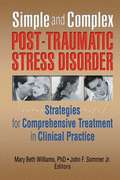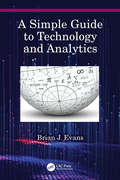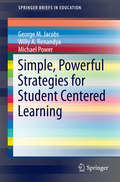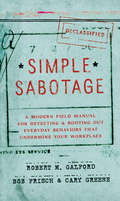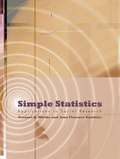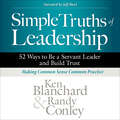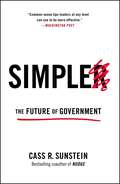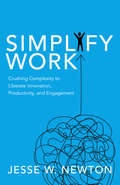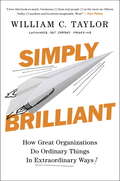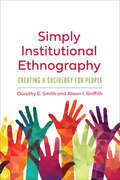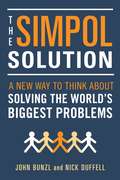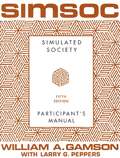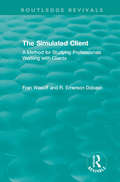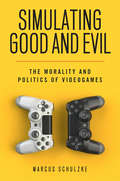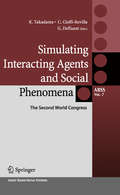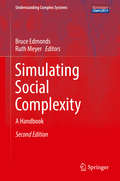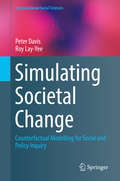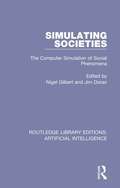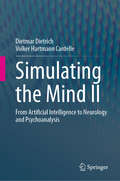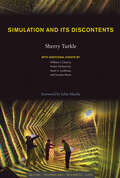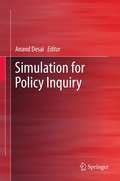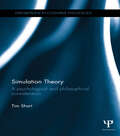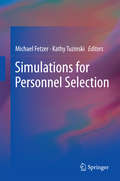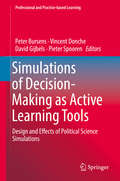- Table View
- List View
Simple and Complex Post-Traumatic Stress Disorder: Strategies for Comprehensive Treatment in Clinical Practice
by Mary Beth Williams John F Sommer Jr.Discover the latest treatment strategies from the leading experts in the field of trauma!This unique book, by the authors of the classic Handbook of Post-Traumatic Therapy, provides the “how to” of clinical practice techniques in a variety of settings with a variety of clients. Simple and Complex Post-Traumatic Stress Disorder: Strategies for Comprehensive Treatment in Clinical Practice delivers state-of-the-art techniques and information to help traumatized individuals, groups, families, and communities. From critical incident debriefing to treating combat veterans with longstanding trauma, it covers the full spectrum of PTSD clients and effective treatments. This valuable book assembles some of the most highly respected experts in trauma studies to discuss the practical applications of their research and their experience treating clients with PTSD. Simple and Complex Post-Traumatic Stress Disorder addresses concerns about the efficacy of critical incident stress debriefing, examines the value of a variety of innovative treatment methods, and explores the differences between treating complex PTSD and the aftermath of a one-time traumatic event. Simple and Complex Post-Traumatic Stress Disorder discusses the issues, stages, and modalities of PTSD treatment, including: assessment and diagnosis psychopharmacological treatment cognitive behavioral treatment short-term treatment group treatments treatment strategies for traumatized children, families, hostages, police, and veterans media issuesSimple and Complex Post-Traumatic Stress Disorder is an indispensable resource for clinicians, researchers, law enforcement officials, and scholars in the field of trauma.
A Simple Guide to Technology and Analytics
by Brian J. EvansEveryday technology is constantly changing, and it’s hard to keep up with it at times. What is all this talk about automation, STEM, analytics and super-computers, and how will it really affect my daily life at work and in the home? This book is a simple guide to everyday technology and analytics written in plain language. It starts with explaining how computer networks are increasing in speed so fast that we can do more in less time than ever before. It explains the analytical jargon in plain English and why robotics in the home will be aided by the new technology of the quantum computer. Richly furnished with over 200 illustrations, photos and with minimal equations, A Simple Guide to Technology and Analytics is a ready reference book for those times when you don’t really understand the technology and analytics being talked about. It explains complicated topics such as automated character recognition in a very simple way, and has simple exercises for the reader to fully understand the technology (with answers at the back). It even has explanations on how home appliances work, which are very useful the next time you go shopping for a microwave or TV. Even the Glossary at the back can be used as a quick look-up explanation for those on the go.
Simple, Powerful Strategies for Student Centered Learning
by George Martin Jacobs Willy Ardian Renandya Michael PowerThis book reminds us teachers about all the little things we can do to be more student-centric. It shows teachers how to "walk the walk," and shows teacher educators how to guide colleagues along a student-centered path. The book examines why we should and how we can promote student-student interaction to enable students to learn more and enjoy the process. It also offers simple but effective strategies for enhancing student motivation, a factor that many experts consider to be the most important determinant of success in educational endeavors. In addition, it examines diversity, particularly the many differences that exist among students, and explains simple, easy strategies for how this diversity can be not only taken into consideration, but actively celebrated.
Simple Sabotage: A Modern Field Manual for Detecting and Rooting Out Everyday Behaviors That Undermine Your Workplace
by Robert M. Galford Bob Frisch Cary GreeneInspired by the Simple Sabotage Field Manual released by the Office of Strategic Services in 1944 to train European resistors, this is the essential handbook to help stamp out unintentional sabotage in any working group, from major corporations to volunteer PTA committees.In 1944, the Office of Strategic Services (OSS)--the predecessor of today's CIA--issued the Simple Sabotage Field Manual that detailed sabotage techniques designed to demoralize the enemy. One section focused on eight incredibly subtle--and devastatingly destructive--tactics for sabotaging the decision-making processes of organizations. While the manual was written decades ago, these sabotage tactics thrive undetected in organizations today: Insist on doing everything through channels. Make speeches. Talk as frequently as possible and at great length. Refer all matters to committees. Bring up irrelevant issues as frequently as possible. Haggle over precise wordings of communications. Refer back to matters already decided upon and attempt to question the advisability of that decision. Advocate caution and urge fellow-conferees to avoid haste that might result in embarrassments or difficulties later on. Be worried about the propriety of any decision.Everyone has been faced with someone who has used these tactics, even when they have meant well. Filled with proven strategies and techniques, this brief, clever book outlines the counter-sabotage measures to detect and reduce the impact of these eight classic sabotage tactics to improve productivity, spur creativity, and engender better collegial relationships.
Simple Statistics: Applications in Social Research
by Terance D. Miethe Jane Florence GauthierThe efficient use of statistics can transform excellent research into dynamic, persuasive scholarship. To demystify the process of calculating data, Simple Statistics: Applications in Social Research provides a concise introduction to basic social statistics.
Simple Truths of Leadership: 52 Ways to Be a Servant Leader and Build Trust
by Ken Blanchard Randy ConleyFifty-two essential principles that are easy to implement and practice: &“The ultimate guide to servant leadership.&” —Marshall Goldsmith, New York Times–bestselling author of Mojo Effective leadership is an influence process in which leaders implement everyday common-sense approaches that help people and organizations thrive. Yet somehow, many of these fundamental principles are still missing from most workplaces. In this book, legendary servant leadership expert and #1 New York Times–bestselling author Ken Blanchard and his colleague Randy Conley, a thought leader known for his expertise in the field of trust, share fifty-two Simple Truths that will help leaders everywhere make common-sense leadership common practice. Discover profound, memorable—and in some cases counterintuitive—wisdom such as: • Who should make the first move to extend trust • What role a successful apology plays in building trust • When to use different strokes (leadership styles) for different folks—and for the same folks • Where the most important part of leadership happens • How to create autonomy through boundaries • Why the key to developing people is catching them doing something right A fun, easy read that will make a positive difference in leadership and organizational success, Simple Truths of Leadershipshows how to incorporate simple but essential practices into your leadership style, build trust through servant leadership, and enhance your own life and the lives of everyone around you.
Simpler
by Cass R. SunsteinSimpler government arrived four years ago. It helped put money in your pocket. It saved hours of your time. It improved your children's diet, lengthened your life span, and benefited businesses large and small. It did so by issuing fewer regulations, by insisting on smarter regulations, and by eliminating or improving old regulations. Cass R. Sunstein, as administrator of the most powerful White House office you've never heard of, oversaw it and explains how it works, why government will never be the same again (thank goodness), and what must happen in the future. Cutting-edge research in behavioral economics has influenced business and politics. Long at the forefront of that research, Sunstein, for three years President Obama's "regulatory czar" heading the White House Office of Information and Regulatory Affairs, oversaw a far-reaching restructuring of America's regulatory state. In this highly anticipated book, Sunstein pulls back the curtain to show what was done, why Americans are better off as a result, and what the future has in store. The evidence is all around you, and more is coming soon. Simplified mortgages and student loan applications. Scorecards for colleges and universities. Improved labeling of food and energy-efficient appliances and cars. Calories printed on chain restaurant menus. Healthier food in public schools. Backed by historic executive orders ensuring transparency and accountability, simpler government can be found in new initiatives that save money and time, improve health, and lengthen lives. Simpler: The Future of Government will transform what you think government can and should accomplish.
Simplify Work: Crushing Complexity to Liberate Innovation, Productivity, and Engagement
by Jesse W. NewtonIn urgent response to the epidemic of crippling complexity affecting organizations around the world, Simplify Work reveals the common sources of this virus and outlines practical steps that can be taken to liberate innovation, productivity, and engagement. Complexity is like a vine that gradually grows and expands, wreaking havoc in organizations and individual lives. Growing complexity has traditionally been met with added structures, processes, committees and systems. Consequently, organizations often become a complicated mess, clouding strategic focus, slowing innovation and breeding complacency. It is no wonder that large organizations around the world are failing at an increasing rate and employee engagement levels have never been so low. Simplify Work reveals the typical drivers of complexity and provides a practical method for simplifying work. Inside, global management consultant Jesse Newton delivers a newfound clarity on the case for simplification and the steps organizations and individuals need to take to unleash its potential. He reveals the common drivers of debilitating complexity and provides a recipe for reducing and removing those things getting in the way of peak performance. Based on the research and experiences of a recognized organization effectiveness expert, Simplify Work leaves readers inspired and equipped to create a new liberating reality in both their organization and their life.
Simply Brilliant: How Great Organizations Do Ordinary Things in Extraordinary Ways
by William C. TaylorCofounder of Fast Company magazine and bestselling author of Mavericks at Work and Practically Radical shows how true business innovation can spring from the unlikeliest places. Far away from Silicon Valley, in familiar, traditional, even unglamorous fields, ordinary people are unleashing extraordinary advances that amaze customers, energize employees, and create huge economic value. Their secret? They understand that the work of inventing the future doesn't just belong to geeks designing mobile apps and virtual-reality headsets, or to social-media entrepreneurs hoping to launch the next Facebook. Some of today's most compelling organizations are doing brilliant things in simple settings such as retail banks, office cleaning companies, department stores, small hospitals, and auto dealerships.William C. Taylor, cofounder of Fast Company and best-selling author of Practically Radical, traveled thousands of miles to visit these hotbeds of simple brilliance and unearth the principles and practices behind their success. He offers fascinating case studies and powerful lessons that you can apply to do ordinary things in extraordinary ways, regardless of your industr yor profession. Consider, for instance, how... ·Miami Beach's dazzling 1111 Lincoln Road reimagined the humble parking garage as a high-profile public space that hosts weddings, yoga classes, and celebrity gatherings.·USAA, the financial-services giant that provides soldiers and their families with insurance and banking products, inspires frontline employees to deliver legendary service by immersing them in military culture.·Pal's Sudden Service, a fast-food chain with a cult following, serves up burgers and fries with such speed and accuracy that companies from other industries pay to learn from its astonishing discipline. ·Lincoln Electric, a manufacturer based in Euclid, Ohio, dominates its ultracompetitive markets with a fierce devotion to quality and productivity. But the key to its prosperity is a share-the-wealth model that gives everybody a sense of security and a piece of the action. It has maintained a strict no-layoff pledge since 1958. As Taylor writes: "The story of this book, its message for leaders who aim to do something important and build something great, is both simple and subversive: In a time of wrenching disruptions and exhilarating advances, of unrelenting turmoil and unlimited promise, the future is open to everybody. The thrill of breakthrough creativity and breakaway performance . . . can be summoned in all sorts of industries and all walks of life, if leaders can reimagine what's possible in their fields." Simply Brilliant shows you how.From the Hardcover edition.
Simply Institutional Ethnography: Creating a Sociology for People
by Dorothy E. Smith Alison I. GriffithInstitutional ethnography (IE) originated as a feminist alternative to sociologies defining people as the objects of study. Instead, IE explores the social relations that dominate the life of the particular subject in focus. Simply Institutional Ethnography is written by two pioneers in the field and grounded in decades of ground-breaking work. Dorothy Smith and Alison Griffith lay out the basics of how institutional ethnography proceeds as a sociology. The book introduces the concepts – Discourse, Work, Text – that institutional ethnographers have found to be key ideas used to organize what they learn from the study of people’s experience. Simply Institutional Ethnography builds an ethnography that makes this material visible as coordinated sequences of social relations that reach beyond the particularities of local experience. In explicating the foundations of IE and its principal concepts, Simply Institutional Ethnography reflects on the ways in which the field may move forward.
The SIMPOL Solution: A New Way to Think about Solving the World's Biggest Problems
by John Bunzl Nick DuffellThe SIMPOL Solution, spearheaded by the Simultaneous Policy (SIMPOL) Organization, gives voters around the world a new way to pressure their leaders to address global problems ranging from climate change to mass immigration and gross income disparities.Blending politics and psychology, The SIMPOL Solution shows how through simultaneous action--through cooperation--we can overcome the problems we face today and our children will face tomorrow.The authors argue that the chief barrier to tackling pressing international issues is a vicious circle of destructive global competition, in which nations, corporations, and citizens are helplessly caught. Our current economic system--which rewards corporations and nations that offer the greatest profits no matter what the social costs--has the effect of hollowing out national politics and encouraging either voter apathy or populism championed by the Far Right.The good news is that it doesn't take masses of people to break this vicious circle and initiate lasting change. In fact, key transitions in human history were initiated by small numbers of activists. Already endorsed by leading policy-makers, visionaries, and public figures, this exciting book offers everyone a way to become a part of this important worldwide movement for change.
SIMSOC: Fifth Edition (Participant's Manual)
by Larry G. Peppers William A. GamsonThe official guide to SIMSOC, the dynamic group simulation game whose "potential for stimulating the learning process is staggering" (Teaching Sociology), in which players grapple with the challenge of governing society.In SIMSOC, players confront issues like abuse of power, justice, diversity, trust, and leadership as they negotiate their way through labor-management strife, political turmoil, and natural disasters. Success or failure is dependent upon decisions made by players and the creativity of the group--and every game is a teaching tool. To be successful, players must utilize every basic social process from cooperation and reward to threat and punishment. SIMSOC will make participants ask questions about social control, and bring everyday experience and deeper understanding to even the most arcane social and organizational theory. Included in this Fifth Edition of SIMSOC's Participant's Manual are instructions for playing, materials for play, study questions based on participation, and selected readings about simulation games, leadership, and social processes. New to the Fifth Edition are additional size levels to accommodate groups of up to ninety participants with simplified rules and readings by authors from Nicholas Lemann to Robert Putnam.
SIMSOC: Simulated Society, Participant's Manual
by Larry G. Peppers William A. GamsonSIMSOC: Participant's Manual SIMSOC (which is pronounced sim-sock and stands for simulated society) is a dynamic group simulation game that forces participants to cope with the daily problems of governing society. Assuming a variety of roles, the players grapple with issues like abuse of power, justice, diversity, trust, and leadership as they negotiate their way through labor-management strife, political turmoil, and natural disasters. SIMSOC imposes few rules and restrictions upon its participants. There is no programmed outcome. Success or failure is dependent upon decisions made by players and the creativity of the group. To be successful, players must utilize every basic social process from cooperation and reward to threat and punishment. SIMSOC will make participants ask questions about social control, and bring everyday experience and deeper understanding to even the most arcane social and organizational theory. Included in this Fifth Edition of SIMSOC's Participant's Manual are instructions for playing, materials for play, study questions based on participation, and selected readings about simulation games, leadership, and social processes. New to the Fifth Edition are additional size levels to accommodate larger groups, simplified rules, and readings by authors from Nicholas Lemann to Robert Putnam. Each SIMSOC participant should have a copy of the Participant's Manual and the instructor a copy of SIMSOC's Coordinator's Manual, which contains additional materials needed for play and directions on how to set up and run SIMSOC. One Coordinator's Manual will be needed for each SIMSOC exercise of up to ninety participants. It can be obtained, for a $5.00 fee, by writing, on letterhead, to: The Free Press A Division of Simon & Schuster, Inc. Faculty Service Desk 1230 Avenue of the Americas New York, NY 10020
The Simulated Client: A Method for Studying Professionals Working with Clients (Routledge Revivals)
by Fran Wasoff R. Emerson DobashPublished in 1996, this book presents an innovative method for studying the work of professionals with clients that was applied to an evaluation study of legislation and of lawyers working with clients seeking a divorce. With the simulated client methods, the researcher plays the role of simulated or hypothetical clients with predetermined characteristics who are consulting a lawyer, the research subject. The research is carried out in the natural setting of the lawyer’s office and the lawyer conducts business as usual. The method overcomes problems of access due to client confidentiality that are commonly found in research of professional groups. It is a qualitative but focused method for evaluation research which has strengths for making comparisons across professional practice. The book will be useful to those conducting research on professionals and other elite groups working with clients as well as those interested in the socio-legal study of legal professionals. This book was originally published as part of the Cardiff Papers in Qualitative Research series edited by Paul Atkinson, Sara Delamont and Amanda Coffey. The series publishes original sociological research that reflects the tradition of qualitative and ethnographic inquiry developed at Cardiff. The series includes monographs reporting on empirical research, edited collections focussing on particular themes, and texts discussing methodological developments and issues.
Simulating Good and Evil: The Morality and Politics of Videogames
by Marcus SchulzkeSimulating Good and Evil shows that the moral panic surrounding violent videogames is deeply misguided, and often politically motivated, but that games are nevertheless morally important. Simulated actions are morally defensible because they take place outside the real world and do not inflict real harms. Decades of research purporting to show that videogames are immoral has failed to produce convincing evidence of this. However, games are morally important because they simulate decisions that would have moral weight if they were set in the real world. Videogames should be seen as spaces in which players may experiment with moral reasoning strategies without taking any actions that would themselves be subject to moral evaluation. Some videogame content may be upsetting or offensive, but mere offense does not necessarily indicate a moral problem. Upsetting content is best understood by applying existing theories for evaluating political ideologies and offensive speech.
Simulating Interacting Agents and Social Phenomena
by Claudio Cioffi-Revilla Guillaume Deffuant Keiki TakadamaAgent-based modeling and social simulation have emerged as an interdisciplinary area of social science that includes computational economics, organizational science, social dynamics, and complex systems. This area contributes to enriching our understanding of the fundamental processes of social phenomena caused by complex interactions among agents. Bringing together diverse approaches to social simulation and research agendas, this book presents a unique collection of contributions from the Second World Congress on Social Simulation, held in 2008 at George Mason University in Washington DC, USA. This book in particular includes articles on norms, diffusion, social networks, economy, markets and organizations, computational modeling, and programming environments, providing new hypotheses and theories, new simulation experiments compared with various data sets, and new methods for model design and development. These works emerged from a global and interdisciplinary scientific community of the three regional scientific associations for social simulation: the North American Association for Computational Social and Organizational Science (NAACSOS; now the Computational Social Science Society, CSSS), the European Social Simulation Association (ESSA), and the Pacific Asian Association for Agent-bBased Approach in Social Systems Sciences (PAAA).
Simulating Social Complexity: A Handbook (Understanding Complex Systems)
by Bruce Edmonds Ruth MeyerSocial systems are among the most complex known. This poses particular problems for those who wish to understand them. The complexity often makes analytic approaches infeasible and natural language approaches inadequate for relating intricate cause and effect. However, individual- and agent-based computational approaches hold out the possibility of new and deeper understanding of such systems. Simulating Social Complexity examines all aspects of using agent- or individual-based simulation. This approach represents systems as individual elements having each their own set of differing states and internal processes. The interactions between elements in the simulation represent interactions in the target systems. What makes these elements "social" is that they are usefully interpretable as interacting elements of an observed society. In this, the focus is on human society, but can be extended to include social animals or artificial agents where such work enhances our understanding of human society. The phenomena of interest then result (emerge) from the dynamics of the interaction of social actors in an essential way and are usually not easily simplifiable by, for example, considering only representative actors. The introduction of accessible agent-based modelling allows the representation of social complexity in a more natural and direct manner than previous techniques. In particular, it is no longer necessary to distort a model with the introduction of overly strong assumptions simply in order to obtain analytic tractability. This makes agent-based modelling relatively accessible to a range of scientists. The outcomes of such models can be displayed and animated in ways that also make them more interpretable by experts and stakeholders. This handbook is intended to help in the process of maturation of this new field. It brings together, through the collaborative effort of many leading researchers, summaries of the best thinking and practice in this area and constitutes a reference point for standards against which future methodological advances are judged. This book will help those entering into the field to avoid "reinventing the wheel" each time, but it will also help those already in the field by providing accessible overviews of current thought. The material is divided into four sections: Introductory, Methodology, Mechanisms, and Applications. Each chapter starts with a very brief section called 'Why read this chapter?' followed by an abstract, which summarizes the content of the chapter. Each chapter also ends with a section of 'Further Reading' briefly describing three to eight items that a newcomer might read next.
Simulating Societal Change: Counterfactual Modelling for Social and Policy Inquiry (Computational Social Sciences)
by Peter Davis Roy Lay-YeeThis book presents a method for creating a working model of society, using data systems and simulation techniques, that can be used for testing propositions of scientific and policy nature. The model is based on the example of New Zealand, but will be applicable to other countries. It is expected that collaborators in other countries can emulate this example with their data systems for teaching and policy purposes, producing a cross-national "collaboratory". This enterprise will evolve with, and to a degree independently of, the book itself, with a supporting website as well as teaching and scientific initiatives. Readers of this text will, for the first time, have a simulation-based working model of society that can be interrogated for policy and substantive purposes. This book will appeal to researchers and professionals from various disciplines working within the social sciences, particularly on matters of demography and public policy.
Simulating Societies: The Computer Simulation of Social Phenomena (Routledge Library Editions: Artificial Intelligence #6)
by Nigel Gilbert Jim DoranThe most exciting and productive areas of academic inquiry are often where the interests of two disciplines meet. This is certainly the case for the subject of this book, originally published in 1994, which explores the contribution that computer-based modelling and artificial intelligence can make to understanding fundamental issues in social science. Simulating Societies shows how computer simulations can help to clarify theoretical approaches, contribute to the evaluation of alternative theories, and illuminate one of the major issues of the social sciences: how social phenomena can "emerge" from individual action. The authors discuss how simulation models can be constructed using recently developed artificial intelligence techniques and they consider the methodological issues involved in using such models for theory development, testing and experiment. The introductory chapters situate the book within social science, and suggest why the time was ripe for significant progress, before defining basic terminology, showing how simulation has been used to theorize about organizations, and indicating through examples some of the fundamental issues involved in simulation. The main body of the text provides case studies drawn from economics, anthropology, archaeology, planning, social psychology and sociology. The appeal of this path-breaking book was twofold. It offered an essential introduction to simulation for social scientists and it provided case study applications for computer scientists interested in the latest advances in the burgeoning area of distributed artificial intelligence (DAI) at the time.
Simulating the Mind II: From Artificial Intelligence to Neurology and Psychoanalysis
by Dietmar Dietrich Volker Hartmann CardelleThe declared goal of this book, an extended and revised translation of the German edition (2021), is to show how a unified model of the psyche and body can be developed via insights from psychoanalysis, neurology and computer technology. On the one hand, such a model allows for the testing of psychological and social theories on a scientific basis with the help of simulation experiments. On the other hand, the model developed according to the functional structures of the human brain and psyche provides the basis for artificial intelligence systems. These are systems with cognitive capabilities that can save human lives, save energy, ensure safety at airports, provide support in old-age care and in the medical field; in other words and generally speaking, systems that can simplify our lives in a relevant way and on a broad basis. A great deal of time and money is invested in genetic engineering and neurology, but research into the mental apparatus in the context of the neurological part, i.e., modeling the brain in a holistic way, is sparse in every respect. However, the results of the scientific project SiMA, of which the first author has been a driving force, show that the research of this organ, which in the authors’ understanding includes the mental apparatus, as a whole, is quite feasible today. This is also the main message of the book, which addresses topics such as artificial intelligence, the brain, psychoanalysis, behavioral models, complexity, bionics of the mental, emotions and feelings, consciousness and awareness, preconscious and unconscious, the functional (and not only behavioral) description and modeling of the brain and especially of the mental apparatus, and some more. In the world of technology, there is generally little interest in psychoanalysis, whereas in the world of psychoanalysis, people usually refuse to deal with mathematics and technology, especially computer technology. Is there an information theory of the brain on the one hand, and of computer technology on the other hand? The authors attempt to answer this question from both sides. With the goal to reach as many readers as possible and to provoke, the authors break with traditions and give space to new forms of thinking and argue that it is crucial to take a new path in automation, in artificial intelligence and in (technical) cognitive science, but also in psychoanalysis and neurology, in order to create a common basis for scientific and technical possibilities that have been previously inaccessible.
Simulation and Its Discontents (Simplicity: Design, Technology, Business, Life)
by Sherry TurkleHow the simulation and visualization technologies so pervasive in science, engineering, and design have changed our way of seeing the world.Over the past twenty years, the technologies of simulation and visualization have changed our ways of looking at the world. In Simulation and Its Discontents, Sherry Turkle examines the now dominant medium of our working lives and finds that simulation has become its own sensibility. We hear it in Turkle's description of architecture students who no longer design with a pencil, of science and engineering students who admit that computer models seem more “real” than experiments in physical laboratories.Echoing architect Louis Kahn's famous question, “What does a brick want?”, Turkle asks, “What does simulation want?” Simulations want, even demand, immersion, and the benefits are clear. Architects create buildings unimaginable before virtual design; scientists determine the structure of molecules by manipulating them in virtual space; physicians practice anatomy on digitized humans. But immersed in simulation, we are vulnerable. There are losses as well as gains. Older scientists describe a younger generation as “drunk with code.” Young scientists, engineers, and designers, full citizens of the virtual, scramble to capture their mentors' tacit knowledge of buildings and bodies. From both sides of a generational divide, there is anxiety that in simulation, something important is slipping away. Turkle's examination of simulation over the past twenty years is followed by four in-depth investigations of contemporary simulation culture: space exploration, oceanography, architecture, and biology.
Simulation for Policy Inquiry
by Anand DesaiPublic policy and management problems have been described as poorly defined, messy, squishy, unstructured, intractable, and wicked. In a word, they are complex. This book illustrates the development and use of simulation models designed to capture some of the complexity inherent in the formulation, management, and implementation of policies aimed at addressing such problems. Simulation models have long existed at the fringes of policy inquiry but are not yet considered an essential component of the policy analyst's toolkit. However, this situation is likely to change because with improvements in computational power and software, simulation is now easier to include in the standard repertoire of research tools available for discovery and decision support. This volume provides both a conceptual rationale for using simulations to inform public policy and a practical introduction to how such models might be constructed and employed. The focus of these papers is on the uses of simulation to gain understanding and inform policy decisions and action. Techniques represented in this volume include Monte Carlo simulation, system dynamics and agent based modeling.
Simulation Theory: A psychological and philosophical consideration (Explorations in Cognitive Psychology)
by Tim ShortTheory of Mind (ToM) is the term used for our ability to predict and explain the behaviour of ourselves and others. Accounts of this theory have so far fallen into two competing types: Simulation Theory and ‘Theory Theory’. In contrast with Theory Theory, Simulation Theory argues that we predict behaviour not by employing a model of people, but by replicating others’ thoughts and feelings. This book presents a novel defence of Simulation Theory, reviewing the major challenges against it and positing the theory as the most effective method for exploring how we know each other and ourselves. Drawing on key research in the field, chapters reopen the debates surrounding Theory of Mind and cover a variety of topics including schizophrenia with implications for experimental social psychology. In the past, one of the greatest criticisms against Simulation Theory is that it cannot explain systematic error in Theory of Mind. This book explores the rapidly developing heuristics and biases programme, pioneered by Kahneman and Tversky, to suggest that a novel bias mismatch defence available to Simulation Theory explains these systematic errors. Simulation Theory: A psychological and philosophical consideration will appeal to a range of researchers and academics, including psychologists from the fields of cognitive, social and developmental psychology, as well as philosophers, psychotherapists and practitioners looking for further research on Theory of Mind. The book will also be of relevance to those interested in autism, since it offers a new approach to Theory of Mind which explains central symptoms in autistic subjects.
Simulations for Personnel Selection
by Kathy Tuzinski Michael FetzerThis book provides a comprehensive and state-of-the-art overview of simulation development, technologies, and implementation, including real-world examples and results followed by a preview of what's on the horizon that will further revolutionize the industry. More than a handful of books have been written on the use of simulations for training purposes, but this book focuses solely on simulations in employee selection contexts (e.g., hiring, promotion), making it a truly unique and valuable resource for both practitioners and academics. The science and practice of employee selection has advanced at a steady pace over the past two or three decades. However, recent advancements in both technology and assessment methods have been the catalyst for an evolutionary leap in the use of simulations in this area.
Simulations of Decision-Making as Active Learning Tools: Design And Effects Of Political Science Simulations (Professional and Practice-based Learning #22)
by Pieter Spooren David Gijbels Vincent Donche Peter BursensThis volume brings together both political and educational scientists. While educational research literature has so far not systematically addressed the tool of simulations of decision-making, political scientists have hardly used insights from research on assessment or on motivation and interest of students. Almost all political science publications on simulations merely discuss how to implement the tool in class and fall short of providing evidence of the effects on student outcomes such as increased interest and performance. Combining the two disciplines is mutually enriching. Political science benefits from state of the art educational science measuring and testing of the claims made by the proponents of simulations, while educational sciences adds the systematic analysis of simulations of decision-making to their list of empirical objects, which also adds insights to the theories on the affective component of student learning. It is the explicit aim of the volume to address how simulating decision-making environments fosters learning. Implications for research and practice regarding student learning are addressed in all chapters.
